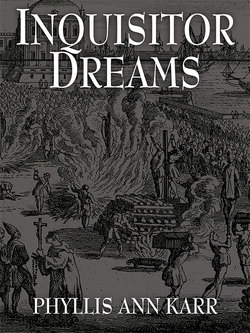Читать книгу Inquisitor Dreams - Phyllis Ann Karr - Страница 9
На сайте Литреса книга снята с продажи.
ОглавлениеChapter 3
Morayma
The Moors were freer about allowing infidels than fellow Islamites into the company of their women, so that Felipe and Gamito had twice seen their friend Hamet’s younger sister. Those two visions of Morayma, coupled with her brother’s accounts of her, had been enough. After his second glimpse, the boy Felipe had begged his father to approach her father with the proposal of an alliance between their houses.
In wealth, the two families were equal. In social standing, comparable: if Morayma’s family was Moorish in a Moorish kingdom, Felipe’s was descended on both sides from some of the noblest blood of Old Spain—on one side, as family tradition maintained, from El Cid himself. It might have been argued forever which family lowered itself to the other. But the barrier of religion, although in the old ways of the kingdom of Karnattah preventing neither friendship nor good business relations, held both fathers back when it came to arranging a union between their offspring while still little more than children.
Felipe was then fourteen, and his father lost little time before shipping him off to Italy, to complete his education in that completely Catholic country. Two years later, in Rome, he received a letter from his mother which included the news that Hamet’s father had wedded Morayma to a rich Moor of the city of Karnattah, where the whole family had moved. Morayma would have been fourteen at the time of her marriage.
As though sensing Felipe’s emotions, in the same packet with that news his mother had sent him her own golden betrothal ring, set with a carnelian bearing the carven likeness of Juno’s head, in hopes that when the time came he would set it upon the finger of his bride to be.
Not that he would ever find one to take the place of Morayma in his heart! No, nothing was left for young Felipe save to worship her as a knight his sovereign lady—the devotion that neither time nor distance could ever dim, for it depended upon the excellence of the lady rather than the fleshly hope of the knight.
Not that actual knighthood was a vocation which held great allure for young Felipe de Bivar y Aguilar, even despite his proud family name. While not sickly, he had no exceptional strength nor stamina. Neither did he feel any burning desire to dress in iron for the purpose of battering and being battered by a fellow mortal similarly armed and clad. Such sports were all very well for leather-coated boys at play with wooden staves; but Felipe had been thwacked twice or thrice with such a mock weapon wielded over-forcefully, and he saw little honor and less usefulness in putting his excellent brain at the mercy of a true sword or mace.
Therefore, he decided upon the Church. Was not a priest in some sense a knight of God? As well as a man in the way to considerable success even in the worldly sense.
He would take orders, but not enter an Order. Being the child of a cloth merchant, he appreciated fine clothing. Being the child of a wealthy family of Karnattah, he possessed a finely developed if somewhat delicate palate, and misliked the thought of coarse diet as much as he misliked that of sleeping with any other discomfort than the inevitable mouse or bedbug. True, religious houses that actually kept their ancient rules and austerities were fewer than those that did not. But in any wild and luxurious cloister, his virtuous devotion to the lost Morayma would doubtless be put to sorer tests than he desired enduring. As a secular he could keep his independence—even, wealth allowing, his own household—along with freedom to hold himself forever pure and innocent of fleshly love, in honor of his lady.
He would be a true knight-errant of Morayma and God: that is, a secular priest.
